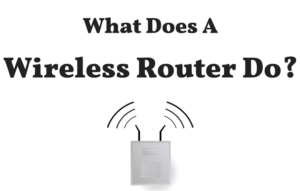What does a router do?
Routers provide Internet access to computers and other devices. A router serves as a dispatcher, determining the optimal path for your data to take. It links your company to the rest of the world, safeguards data from security risks, and can even prioritise some machines over others.
[caption id="attachment_5278" align="aligncenter" width="600"] what is a router[/caption]
what is a router[/caption]Why do you need a router?
A router is a device that connects several devices to the Internet and allows them to communicate with one another. Routers may also be used to set up local networks of devices. If you wish to transfer data between devices or allow staff to share software tools, these local networks are handy.
Your company's data will not be routed to the correct location if you don't have routers. If you want to print a document, for example, you'll need a router to let you get it to a printer rather than another computer or a scanner.
How do modems differ from routers?
Your internet service provider connects your business to the Internet through a modem (ISP). A router, on the other hand, is a device that links a network's various devices, including modems. Modems and other devices may transport data from one area to another with the help of a router.
What are the different types of routers?
Wired routers
Wired routers use network connections to connect directly to modems or wide-area networks (WANs). They usually have a connector for connecting to modems so that they may communicate with the Internet.
Wireless routers
Wireless connections between routers and devices that support the same wireless standards are also possible. Wireless routers can both receive and deliver information over the Internet.
How routers route data
Routing, defined
Routing is the ability to send IP packets, which are data packets with an IP address, from one network to another. The router's function is to link your business's networks and control traffic inside them. Routers usually contain two network interface cards, or NICs, which allow them to connect to other networks.
Speeding data across networks
Routers determine the quickest data channel between connected devices on a network and deliver data along that path. Routers achieve this by using a "metric value," often known as a preference number. If a router has two routes to the same destination, it will take the one with the lowest metric.
Creating a routing table
A routing table is a list of all potential pathways in your network that is stored on your router. When routers receive IP packets that need to be forwarded to another location on the network, they examine the packet's destination IP address before searching the routing table for the routing information.
[caption id="attachment_5277" align="aligncenter" width="474"] What does a router do[/caption]
What does a router do[/caption]If you're in charge of a network, you should learn about routing tables since they'll assist you solve network problems. For example, regardless of your experience with a particular routing protocol, if you understand the structure and lookup process of routing tables, you should be able to identify any routing table issue.
Managing routers
You log in to your router to access its software when you need to make adjustments to your network's routing settings. For example, you can change login passwords, encrypt the network, establish port forwarding rules, and upgrade the router's firmware by logging in to the router.
How routers can help your business
Sharing applications
Employees that operate remotely or outside the main offices benefit from routers since they may have access to company software and thus increase productivity. Specialized services like VoIP, video conferencing, and Wi-Fi networks can all be enabled via routers.
Speeding access to information
With routers in place, your company may improve customer service and provide quicker access to client data. These are significant advantages at a time when customers expect quick responses to queries and individualised care. Employees are better equipped to respond quickly and intelligently to client demands when they use routers to establish a fast and dependable small business network.
Reducing operating costs
Routers have the potential to improve your bottom line. Sharing printers and servers, as well as services like Internet access, can help your small business save money. You won't have to constantly rebuilding the network and buying new devices as your business grows if you use routers to establish a fast and stable network.
Improving security
If your router has built-in firewalls or web filtering, which analyses incoming data and blocks it as appropriate, it can help secure your important business data from assaults.
Enabling secured remote connections
Routers assist your company in providing secure remote access to mobile workers who need to interact with coworkers or access business software. Many organisations with virtual teams and home-based telecommuters need to exchange essential business information at any time of day or night, and this is a frequent scenario.
Creating small business networks with routers
Invest in enterprise-level switches and routers.
Consumer or home networking devices will not be able to keep up with the demands of corporate expansion.
Create networks that can expand over time.
You'll be able to add features and capabilities like video surveillance, VoIP, integrated messaging, and wireless apps as needed.
Choose routers that are built to be dependable and redundant.
This gives you the business continuity you'll need to rapidly recover from unanticipated and disruptive occurrences, such as natural catastrophes.



No comments:
Post a Comment